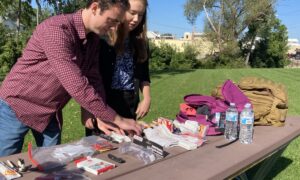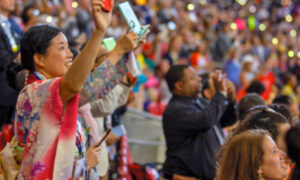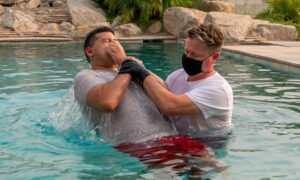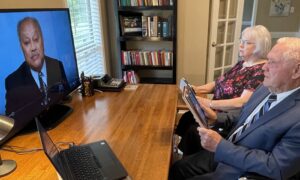Natchitoches – Millions of Jehovah’s Witnesses gathered at a service on Sunday, April 17, to memorialize the sacrificial death of Jesus, in a style unique to a group considered by some to be outside mainstream Christianity.
A reporter of Quaker background had received an invitation from a fellow journalist in Nova Scotia to attend a church service on the evening of April 17. The goal of attending was to foster continued understanding and communication between people of different faiths who have found common ground over nearly two years of acquaintance.
As that Quaker and friend of a Witness I had decided to attend the local Jehovah’s Witness service in Natchitoches with my husband. We had discussed how we might behave if we found the meeting offensive and had decided to be patient no matter what happend and see the occasion as a life experience from which we might learn about others. It turned out to be that and more, as the service had its own levels of meaning, and it also accomplished what a journalist seeks to find in any story and that is information that can be shared with others to produce understanding.
We were greeted eagerly at the door of the local church where the Jehovah’s Witnesses meet for services and special meetings. The smiles, handshakes and warm welcome came from a host of people of different ages and races. We were struck by the diversity of the congregation.
Jehovah’s Witnesses meet in centers they call “Kingdom Halls,” as designated by signage on the front lawn and the entrance of the building where the service was held this evening. The building was modest, as was the front section where designated speakers read from the Bible in commemoration of the death of Christ. The symbol of the Last Supper was addressed by wine and unleavened bread passed through the congregation by church elders. Witnesses refer to this wine and bread as “the meal” that most members of the congregation did not take, because their teachings reference these tokens as designated for those people of higher spiritual calling, who will serve God in heaven as opposed to those who will serve God on earth. Most Witnesses seek to remain in earthly joy following Christ’s return to gather his flock as members observe to be part of the specific promises in the Book of Revelation.
Most Witnesses do not participate in the sacrament, nor do they consider Jesus to be God but rather the Son of God, not to be worshiped as Jehovah. They don’t believe in the Trinity as the Catholics do, for example. In fact, Witnesses are considered heretics by mainstream Christian groups for their unwillingness to accept the Trinity as a doctrine of faith.
As a reporter in a small Southern town on the buckle of the Bible belt, I have been inside most of the main churches, and some of those outside that mainstream, on numerous occasions, for special events at the invitation often of a church member. Those events have included funerals, weddings, holidays and educational meetings in various parts of Natchitoches Parish. The churches, for the most part, remain segregated on Sunday by practice. In fact Chris Manning, an 85-year-old resident of Natchitoches, and one of its best-known real estate agents, told this reporter upon arrival in the town, that the most segregated times in the community are on Sunday and after death, where burial sites remain predominantly one race or another.
But the Witnesses told their own story of relationships in their assemblage on Sunday evening. A racially-balanced group is a rare sight in Natchitoches, unless it is a political event, festival or holiday; but for this religious group, a common occurrence. One of the members smiled proudly as she sat next to me, sharing her Bible and hymnal, and said, “We are the most integrated church in Natchitoches.”
The Memorial is a particularly special experience for Witnesses who do not celebrate holidays. Religion Facts quotes from the official website of the Witnesses that states:
Jesus never commanded Christians to celebrate his birth. Rather, he told his disciples to memorialize, or remember, his death. (Luke 22:19, 20) Christmas and its customs come from ancient false religions. The same is true of Easter customs, such as the use of eggs and rabbits. The early Christians did not celebrate Christmas or Easter, nor do true Christians today.
The only two birthday celebrations spoken of in the Bible were held by persons who did not worship Jehovah. (Genesis 40:20-22; Mark 6:21, 22, 24-27) The early Christians did not celebrate birthdays. The custom of celebrating birthdays comes from ancient false religions. True Christians give gifts and have good times together at other times during the year.
This evening’s service consisted of readings from the Bible, songs at the beginning and end of the service, and “the Meal.” The purpose of the memorial is to honor what Witnesses and other Christians consider to be the sacrificial death of Jesus on a stake.
While the rest of Christianity awaits Easter’s arrival in a matter of days, Jehovah’s Witnesses gave reverence this evening in their own way of that belief in Jesus’ sacrifice, a man whose final days are of particular consequence to all Christians.
http://www.digitaljournal.com/article/305727





